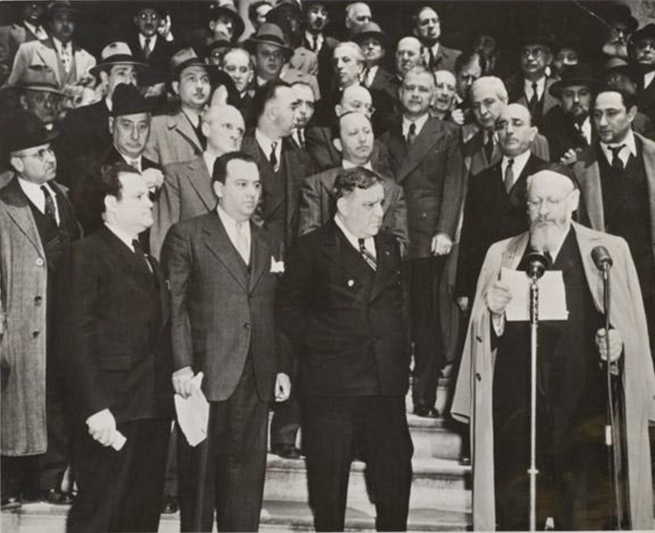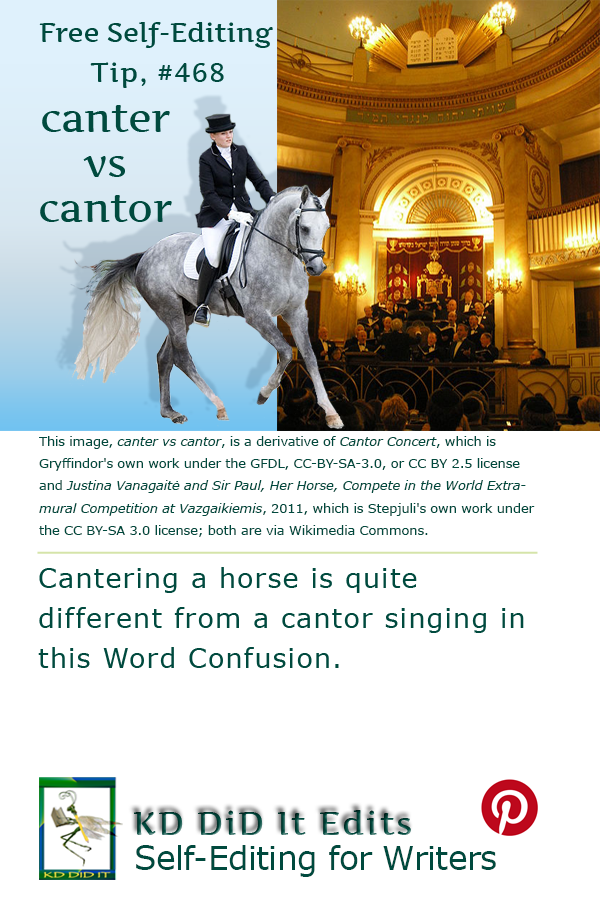Revised as of
2 Nov 2022
I can’t begin to say how often I run into this Word Confusion, an heterograph (a subset of homophone), naturally. And every single time, an image of a Jewish cantor rises up in front of me. What he’s doing cantering on the horse has me all confused. I think he is too.
I’d like to see a cantor ride a horse at a canter.
| Looking at the following: | |
|---|---|
| Then he slowed the horse to a canter.
Slowed down from a gallop. |
Then he slowed the horse to a cantor.
I’m guessing that as he approached the cantor, he slowed the horse so he didn’t run over the guy. |
Word Confusions . . .
. . . started as my way of dealing with a professional frustration with properly spelled words that were out of context in manuscripts I was editing as well as books I was reviewing. It evolved into a sharing of information with y’all. I’m hoping you’ll share with us words that have been a bête noire for you from either end.
If you found this post on “Canter versus Cantor” interesting, consider tweeting it to your friends. Subscribe to KD Did It, if you’d like to track this post for future updates.
| Canter | Cantor |
|---|---|

North Forks Cardi Flying Change by Nikki is under the CC BY-SA 2.0 license, via Wikimedia Commons. — This Welsh cob is at a canter. |

Commemoration of the First Anniversary of the Warsaw Ghetto Uprising, New York City, 1944, has no known copyright restrictions, courtesy of the YIVO Institute for Jewish Research. — The cantor is at the microphones. |
| Noun 1, 2; Verb 3, intransitive & transitive Plural for the noun: canters Third person present verb: canters |
Noun
Plural: cantors |
| Noun: One who uses cant 1 Beggar, vagabond A user of professional or religious cant A three-beat collected gait of a horse during which one or the other of the forelegs and both hind legs lead practically together, followed by the other foreleg and then a complete suspension when all four legs are off the ground 2 Slower than a gallop, but faster than a trot Verb:
Verb, intransitive: To ride a horse at a canter. Verb, transitive: |
A choir leader in Christianity and Judaism
A synagogue official, the hazzan, who sings or chants liturgical music and leads the congregation in prayer In medieval Christianity, the person in charge of supervising the choir’s singing The head of a college of church music |
| Examples: | |
| Noun: ‘E’s a canter he is. Canting that rhyming slang. We rode at a canter for miles. He kicked his horse into a canter. It takes a lot of practice, but eventually you’ll be able to advance to a faster trot and even a canter and still keep your horse on the bit without getting into a pulling match. He wasn’t supposed to ride her in a trot, canter, or gallop. We came back from one of our canters. Verb, intransitive: By the end of the lesson, she is sitting deep in the saddle as her horse canters in a controlled, relaxed manner. All horses canter well when no rider is on board. Verb, transitive: The competitors cantered into the arena. Now if a rider canters his horse inside an arena without any obstacles, like a fence or a jump, he could consider himself a dressage rider and should follow certain rules so not to endanger himself or his mount. The blond little girl clenched her teeth, cantered her mare to the jump, but the mare put an extra stride in, not giving herself space to jump the fence. |
The rabbi has found a fine cantor.
A cantor chooses and conducts the vocals for the choir. The cantor led the chant. The cantor led the responsorial singing with the congregation. |
| History of the Word: | |
|
1538, from the Latin singer, equivalent to can(ere) meaning to sing + -tor (-tor). |
C’mon, get it out of your system, bitch, whine, moan . . . which words are your pet peeves? Also, please note that I try to be as accurate as I can, but mistakes happen or I miss something. Email me if you find errors, so I can fix them . . . and we’ll all benefit!
Satisfy your curiosity about other Word Confusions on its homepage or more generally explore the index of self-editing posts. You may also want to explore Book Layout & Formatting Ideas, Formatting Tips, Grammar Explanations, Linguistics, Publishing Tips, the Properly Punctuated, Writing Ideas and Resources, and Working Your Website.
Resources for Canter versus Cantor
Apple Dictionary.com
Encylopædia Britannica: canter
The Free Online Dictionary: canter
Lexico.com: canter
Merriam Webster: canter
Pinterest Photo Credits:
Cantor Concert is Gryffindor’s own work under the GFDL, CC-BY-SA-3.0 or CC BY 2.5 license and Justina Vanagaitė and Sir Paul, Her Horse, Compete in the World Extramural Competition at Vazgaikiemis, 2011, which is Stepjuli’s own work under the CC BY-SA 3.0license; both are via Wikimedia Commons.



Easy to confuse for the non-equine and the non Jewish…
And there are so many out there who are confused… Does this mean we need more horse-loving people and more Jewish people?